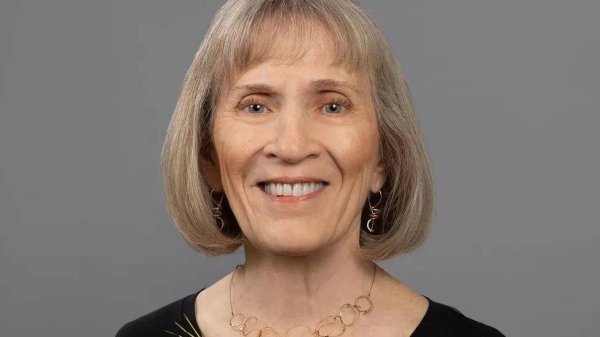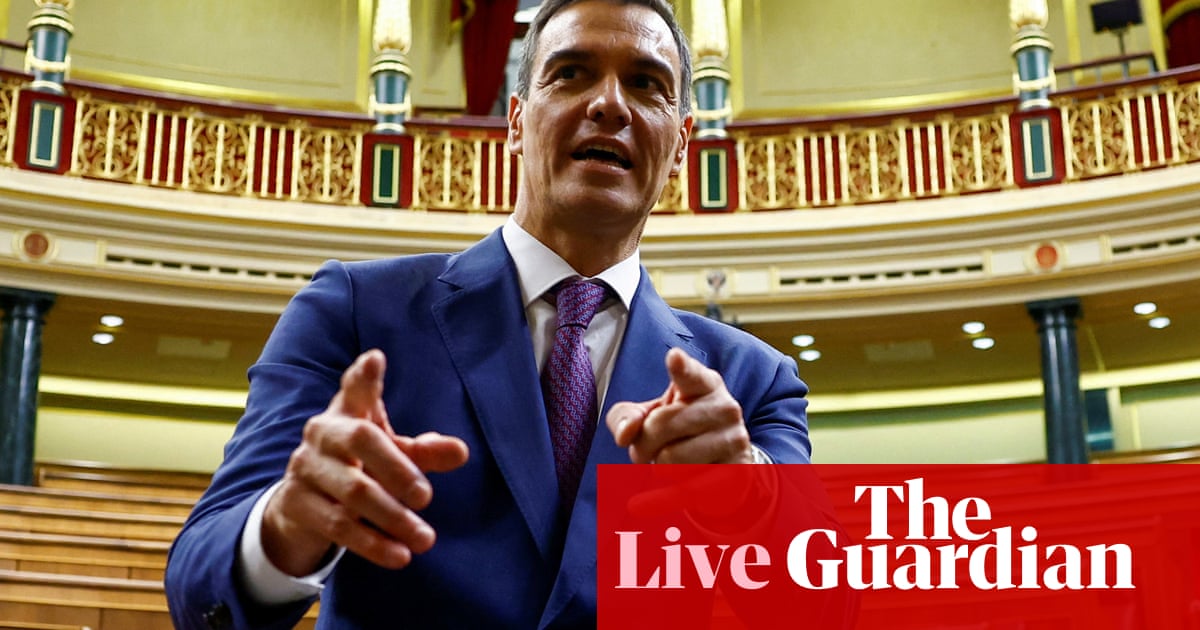
Claudia Goldin wins Nobel prize in economics for research on women in the workplace
Newsflash: The Sveriges Riksbank Prize in Economic Sciences in Memory of Alfred Nobel has been awarded to US economist Claudia Goldin, for her work on women’s participation in the labour market.
Claudia Goldin, the Harvard-based economics professor, has won the biggest prize in economics “for having advanced our understanding of women’s labour market outcomes”.
Goldin is a pioneer in the field of gender economics, examining why the gender pay gap still exists today.
Goldin has shown that gender gaps will not necessarily close with economic development, and that economic growth does not always improve female labour market outcomes.
The Royal Swedish Academy of Sciences says Goldin’s “groundbreaking research” has shown the underlying factors hurting women in the jobs market, and which barriers may need to be addressed.
They explain:
Despite modernisation, economic growth and rising proportions of employed women in the twentieth century, for a long period of time the earnings gap between women and men hardly closed. According to Goldin, part of the explanation is that educational decisions, which impact a lifetime of career opportunities, are made at a relatively young age. If the expectations of young women are formed by the experiences of previous generations – for instance, their mothers, who did not go back to work until the children had grown up – then development will be slow.
Historically, much of the gender gap in earnings could be explained by differences in education and occupational choices. However, Goldin has shown that the bulk of this earnings difference is now between men and women in the same occupation, and that it largely arises with the birth of the first child.
She becomes the third woman to win the Nobel economics prize, after Elinor Ostrom in 2009 and Esther Duflo in 2019.
[This isn’t one of the original prizes funded by Alfred Nobel, but was created in 1968 by Sweden’s central bank].
Closing post
Time for a recap.
Financial markets have been gripped by the shocking attack by Hamas on Israel on Saturday, which has driven up energy prices and hammered shares in airlines.
The oil price is up around 4% in late trading, with Brent crude rallying toward $88 per barrel, as traders calculate that rising tensions across the Middle East could affect output from leading oil producers.
As Capital Economics point out this evening:
First and foremost, the renewed fighting between Hamas and Israel since the weekend is a humanitarian tragedy.
The upshot is that the longer the conflict goes on or the more widespread it becomes, the greater the risks to regional oil supply will be.
Gas prices have jumped sharply, after Israel suspended production at the Tamar gas field in the eastern Mediterranean.
Shares in defence producers have jumped, with BAE Systems up 4.7% in London and Northrop Grumman gaining 10% in New York.
But airlines including IAG (-5.6%), Wizz Air (-6.8%) and easyJet (-5.2%) and holiday firm TUI (6.3%) are down, on concerns the crisis will hit travel.
As investors searched for safe havens, the US dollar, European government bonds and gold all rallied today.
The conflict has also prompted Nvidia to cancel an AI conference in Tel Aviv later this month.
Israel’s central bank stepped in to stabilise its currency this morning. The Bank of Israel said it will sell up to $30bn of foreign currency in the open market to maintain stability, after the shekel hit its lowest level in almost eight years against the US dollar.
In other news…
Harvard professor Claudia Goldin, has won the Nobel Prize for economics for her work advancing the understanding of women’s labour market outcomes.
The Royal Swedish Academy of Sciences said Goldin had uncovered key drivers of gender differences in the labour market.
Jakob Svensson, Chair of the Committee for the Prize in Economic Sciences, explained:
“Understanding women’s role in the labour is important for society. Thanks to Claudia Goldin’s groundbreaking research we now know much more about the underlying factors and which barriers may need to be addressed in the future.”
Metro Bank is launching a fresh cost-cutting drive after the embattled lender clinched a £925m rescue package from investors last night:
Britain’s manufacturers are urging the chancellor, Jeremy Hunt, to announce a “major MOT” of the UK’s “uncompetitive” business tax and regulatory system in his autumn statement next month.
FTSE 100 close
BAE Systems has ended the day as the top riser on the FTSE 100 index, up 4.5%.
BP and Shell both gained almost 3% by the close, lifted by the jump in the oil price today.
But the index was dragged down by British Airways’ parent company IAG (5.8%), and chemicals group Croda (-7.2%) which cut its profit guidance today.
This has left the FTSE 100 down 2 points, or 0.03%, at 7492 points.
Britain’s FTSE 250 index, which contains companies too small for the FTSE 100, has had a rough day.
The FTSE 250 is down almost 1% in late trading, down 163 points at 17,568 points.
Energean, the London and Tel Aviv-listed oil and gas group, are now down 20% on concerns that its production facilities off the coast of Israel could be affected by the conflict.
Wizz Air are down 6.6%, and cruise operator Carnival are off 6.3%, on concerns that travel demand will be hit.
Chipmaking giant Nvidia has canceled a conference on artificial intelligence which was due to take place in Tel Aviv next week due to safety concerns.
Nvidia had scheduled its in-person AI summit, with a keynote by CEO Jensen Huang, for October 15 and 16 at Tel Aviv, calling it “the #1 conference for developers, business leaders, and AI researchers.”
About 2,500 developers, researchers and tech workers were set to attend the two-day conference, according to CNBC.
More than 60 live sessions were expected, on topics ranging from generative AI, supercomputing and large language models, to autonomous vehicles, healthcare and cybersecurity. More here.
Travel stocks are weakening in New York, following similar losses in Europe today.
Cruise operator Carnival Corp are down 6.3%, followed by Delta Air Lines (-5.1%), American Airlines (-5.1%) and United Airlines (4.9%).
Over in New York, the US stock market has opened in the red, but shares in weapons makers and oil companies are rallying.
The S&P 500 index of US stocks has dipped by 0.2%, down 8 points at 4,301 points.
But defence firms are strengthening, with Northrop Grumman - who make are range of military kit including smart ammunition - up 8.5% and Lockheed Martin gaining 8%.
Oil services firm Halliburton has gained 5%, and Marathon Oil are up 4%, following the jump in the crude price today.
Gas prices jump as Israel halts production at Tamar
European gas prices have jumped today, after Israel has suspended production at the Tamar gas field off its southern coast.
US energy producer Chevron said it had been instructed by Israel’s energy ministry to shut down the Tamar natural gas field off the country’s northern coast.
In a statement, Chevron said:
“Chevron Mediterranean Limited was instructed by Israel’s Ministry of Energy to shut in production at the Tamar Production Platform.”
The Tamar natural gas reservoir is located approximately 55 miles (89 kilometers) off Israel’s northern coast, west of Haifa.
News of the shutdown, due to safety concerns after Hamas’s attacks over the weekend, have pushed the European month-ahead gas benchmark up 9.7% to €41.83 per megawatt hour.
The UK day-ahead gas price has surged by 18% to 94.1p per therm, with the month-ahead contract up 12% at 106.6p per therm.
Some of Tamar’s gas is also exported to neighbouring Jordan and Egypt, reports Reuters.
Israel’s energy ministry said in a statement that:
“In the wake of the situation, Israel’s defence establishment ordered the temporary suspension of natural gas supplies from the Tamar field.
“The economy’s energy needs will be supplied by alternative fuels. The power industry is preparing to use alternative fuels to power its stations.”
As flagged earlier, shares in oil exporation company Energean are down 19% this afternoon, on fears that its operations in the Eastern Mediterranean could be disrupted.
FT: Odey to close wealth management business
Odey Asset Management’s wealth business is to close and return assets to clients months after founder Crispin Odey was accused of sexual misconduct, according to the Financial Times.
They explain:
The wealth business is closing in both Guernsey and the UK, according to people familiar with the matter.
The Financial Conduct Authority, the UK regulator, said of the closure: “We are aware of Odey Wealth Management’s intention to wind down the business. We will work closely with the firm as it winds down, to ensure clients are treated fairly.”
The decision to wind down the business comes after the FT published an investigation in June that included detailed allegations from 13 women of sexual assault and harassment by the firm’s eponymous founder.
Brian Albrecht, economist, has written a handy thread on Claudia Goldin’s academic work:
He also highlights the u-shaped curve for female labour force participation, which we flagged earlier:
The dash for safe-haven assets has lifted gold up from a seven-month low today.
Investors have pushed up the price of an ounce of gold to $1,845 today. Last Friday it traded as low as $1,809/oz, the lowest since the end of February.
Craig Erlam, analyst at OANDA, says:
Gold is higher at the start of the week, buoyed perhaps by some safe-haven flows against the backdrop of geopolitical uncertainty. The dollar is also stronger which is typically a headwind for gold but it’s not proving particularly problematic this morning.
The yellow metal has been under immense pressure in recent weeks as investors became increasingly unsure about the inflation and interest rate environment and yields soared. That appears to have steadied for now but policymakers will have plenty of chance to calm nerves - or reinforce those concerns - this week.
The oil price is continuing to rally, with Brent crude up 4% today at around $88 per barrel.
Raffi Boyadjian, lead investment analyst at XM, says there is a danger of disruptions to oil supply in the region if Israel were to take any military action against Iran, potentially with the help of the United States.
Boyadjian adds:
Washington has already said it is sending an aircraft carrier to the region and while it is too early to speculate, investors are wary of the possibility of Iran blockading the Strait of Hormuz, through which 20% of global oil supply flows, in the event of a wider conflict.
Israel successfully held an auction of government debt this morning.
The Israeli government sold 2 billion shekels (£420m) of bonds in its weekly issuance, receiving bids for almost six times as much debt as was on offer.
The Finance Ministry said the bonds were bought by both local and overseas banks, adding:
“The ability to raise debt and finance the government’s activities, even in times of emergency, in significant volumes and with a particularly high coverage ratio, is evidence of market confidence in Israel.”
Back in the financial markets, shares in defence makers continue to rally following the outbreak of the Israel-Hamas war last weekend.
BAE Systems continue to lead the risers on the UK’s FTSE 100 index, up 3.6%.
European rivals Thales (+3.7%), Leonardo (+4.4%) and Dassault Aviation (+3.8%) are also rising, as traders react to rising geopolitical tensions.
Investing.com explains:
In a note to clients, analysts at Wells Fargo predicted that while defence stocks were likely to outperform in the wake of the sudden escalation of the conflict, the fighting is not expected to result in a long-term change in the American defense spending outlook.
“This could change if the scope of the conflict widens,” the Wells Fargo analysts noted.
US defence firms are set to jump when Wall Street opens in 90 minutes, with Lockheed Martin up 4.8% and Northrop Grumman gaining 3.8%.
Here’s a photo of Claudia Goldin speaking to a reporter on the phone in her home in Cambridge, Massachusetts, after learning that she received the Nobel Prize in Economics today:
Back in the UK, e-commerce giant Amazon is preparing for the Christmas rush by recruiting 15,000 people to fill seasonal roles.
Amazon, which has faced strikes by workers seeking wage rises at its warehouses this year, has also announced a pay rise for its staff of at least £1 an hour.
The minimum starting pay for frontline employees will increase to between £11.80 and £12.50 an hour depending on location.
The rise, for all full-time, part-time, temporary and seasonal roles, will be effective from October 15.
Racheal Fagan, GMB organiser, says:
“This news will bring little comfort to the thousands of Amazon workers facing poverty pay, unsafe working conditions and workplace surveillance.
“Amazon has spent millions fighting their own workers over union rights and fair pay.
“GMB members have forced a pay rise from one of the world’s most powerful corporations – but Amazon can and must do better.”
Claudia Goldin has long been a pioneer for women in economics.
In 1989, for example, she became the first woman to be offered tenure in Harvard’s economics department.
A recent profile published by the International Monetary Fund explained:
Goldin is frequently cited as one of the 10 most influential female economists in the world.
She pioneered the study of women’s role in the economy 40 years ago, inspired new generations of female economists, and helped bring gender economics into the mainstream. Goldin won the IZA Prize in Labor Economics in 2016 and the Society of Labor Economists’ Mincer Prize for lifetime contributions in 2009.
She was president of the American Economic Association in 2013–14 and was the first woman to receive tenure in economics at Harvard and the University of Pennsylvania.
Jason Furman, the former top economic adviser to President Obama, says Goldin’s success today is “fantastic”.
He also points us to his review of her book, Career and Family, which explained how the gender pay gap was due to institutional hurdles, rather than discrimination – and how having a child has a significant, negative impact on a woman’s earnings.












